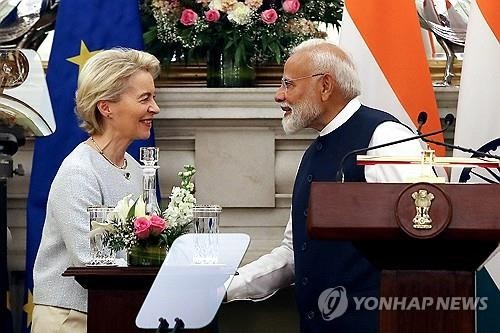Negotiators to meet in New Delhi to resolve remaining issues, including CBAM and tariff adjustments

India and the European Union (EU) moved closer to concluding a long-awaited free trade agreement (FTA), as both sides prepared to address outstanding issues related to steel, automobiles, and carbon emissions regulations in New Delhi next week.
The negotiations, which resumed in 2022 after a nine-year hiatus, have progressed significantly in recent months. However, officials acknowledged that certain sectors remain highly sensitive and require further compromise.
In a statement on October 30 (local time), India’s Ministry of Commerce and Industry said that a high-level EU trade delegation will travel to New Delhi “with the aim of reaching a constructive conclusion.” The announcement followed a meeting between Indian Commerce Minister Piyush Goyal and EU Executive Vice President Maroš Šefčovič in Brussels earlier this week.
While both sides have reportedly narrowed differences across several areas, discussions on automobile tariffs and the EU’s Carbon Border Adjustment Mechanism (CBAM) are still ongoing.
India has expressed concerns that CBAM—which will impose tariffs of 20–35% on carbon-intensive imports such as steel, aluminum, and cement from 2026—could disproportionately affect its manufacturing sector.
Meanwhile, the EU has called on India to significantly reduce high import tariffs on automobiles and premium consumer goods, arguing that the current structure restricts market access for European manufacturers.
India and the EU have one of the world's most robust trading relationships. Bilateral trade has nearly doubled in the past decade, reaching $137.5 billion last year—accounting for more than 12% of India’s total trade volume.
The FTA negotiations, originally launched in 2007, stalled in 2013 over concerns related to intellectual property protection and tariff liberalization. Talks resumed in 2022 amid shifting global supply chains and rising trade tensions, including U.S. tariff pressure on both India and the EU.
Šefčovič noted that the ongoing discussions reflect a high degree of political trust between the two sides, saying they are “committed to finding fair solutions that strengthen trade and economic security.”
Minister Goyal echoed the sentiment, stating that both sides are working to establish a “balanced and predictable framework that supports transparent and mutually beneficial trade.”
The upcoming round of meetings is expected to serve as a critical stage in determining whether the agreement can be finalized by the end of the year.

